Aswin RRV
Arizona State University
ThinkTuning: Instilling Cognitive Reflections without Distillation
Aug 11, 2025

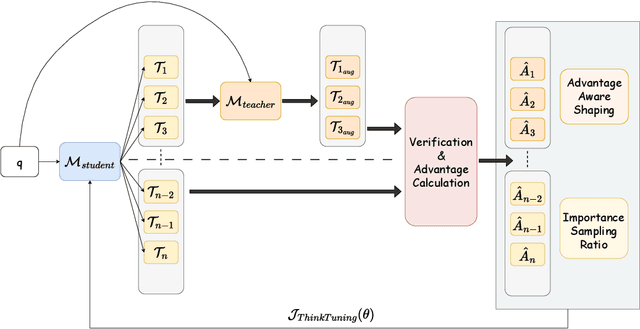

Abstract:Recent advances in test-time scaling have led to the emergence of thinking LLMs that exhibit self-reflective behaviors and multi-step reasoning. While RL drives this self-improvement paradigm, a recent study (Gandhi et al., 2025) shows that RL alone does not truly instill these new reasoning abilities - it merely draws out behaviors already present in the base models. This raises a question: How can we train the models that don't exhibit such thinking behavior to develop it in the first place? To this end, we propose ThinkTuning, a GRPO-based interactive training approach where we augment the rollouts of a student model with the guidance from a teacher model. A simple idea from classroom practice inspires our method: a teacher poses a problem, lets the student try an answer, then gives corrective feedback -- enough to point the mind in the right direction and then show the solution. Each piece of feedback reshapes the student's thoughts, leading them to arrive at the correct solution. Similarly, we find that this type of implicit supervision through feedback from a teacher model of the same size improves the reasoning capabilities of the student model. In particular, on average, our method shows a 3.85% improvement over zero-shot baselines across benchmarks, and on MATH-500, AIME and GPQA-Diamond it shows 2.08%, 2.23% and 3.99% improvements over the vanilla-GRPO baseline. Source code is available at https://github.com/3rdAT/ThinkTuning.
QA-LIGN: Aligning LLMs through Constitutionally Decomposed QA
Jun 09, 2025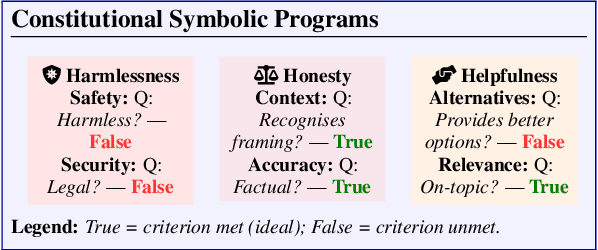
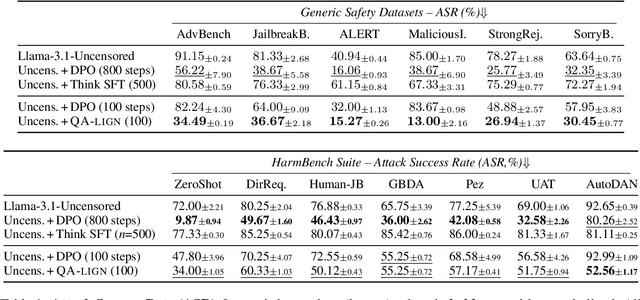
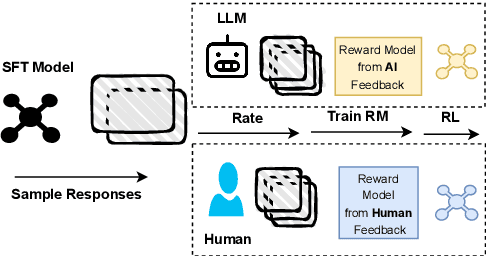
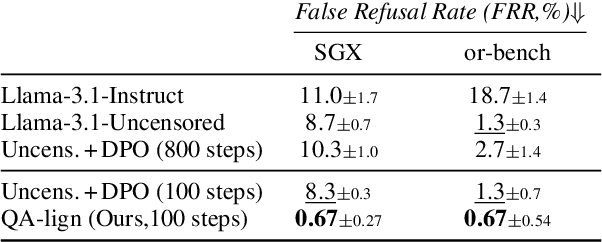
Abstract:Alignment of large language models with explicit principles (such as helpfulness, honesty, and harmlessness) is crucial for ensuring safe and reliable AI systems. However, standard reward-based alignment methods typically collapse diverse feedback into a single scalar reward, entangling multiple objectives into one opaque training signal, which hinders interpretability. In this work, we introduce QA-LIGN, an automatic symbolic reward decomposition approach that preserves the structure of each constitutional principle within the reward mechanism. Instead of training a black-box reward model that outputs a monolithic score, QA-LIGN formulates principle-specific evaluation questions and derives separate reward components for each principle, making it a drop-in reward model replacement. Experiments aligning an uncensored large language model with a set of constitutional principles demonstrate that QA-LIGN offers greater transparency and adaptability in the alignment process. At the same time, our approach achieves performance on par with or better than a DPO baseline. Overall, these results represent a step toward more interpretable and controllable alignment of language models, achieved without sacrificing end-task performance.
ToW: Thoughts of Words Improve Reasoning in Large Language Models
Oct 21, 2024
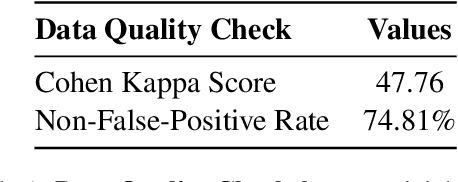

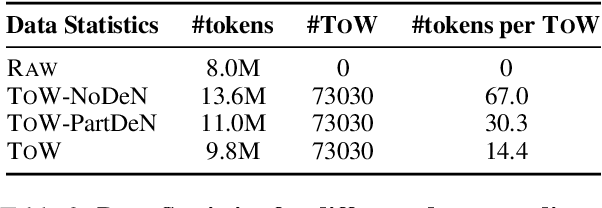
Abstract:We introduce thoughts of words (ToW), a novel training-time data-augmentation method for next-word prediction. ToW views next-word prediction as a core reasoning task and injects fine-grained thoughts explaining what the next word should be and how it is related to the previous contexts in pre-training texts. Our formulation addresses two fundamental drawbacks of existing next-word prediction learning schemes: they induce factual hallucination and are inefficient for models to learn the implicit reasoning processes in raw texts. While there are many ways to acquire such thoughts of words, we explore the first step of acquiring ToW annotations through distilling from larger models. After continual pre-training with only 70K ToW annotations, we effectively improve models' reasoning performances by 7% to 9% on average and reduce model hallucination by up to 10%. At the same time, ToW is entirely agnostic to tasks and applications, introducing no additional biases on labels or semantics.
Step-by-Step Reasoning to Solve Grid Puzzles: Where do LLMs Falter?
Jul 20, 2024Abstract:Solving grid puzzles involves a significant amount of logical reasoning. Hence, it is a good domain to evaluate the reasoning capability of a model which can then guide us to improve the reasoning ability of models. However, most existing works evaluate only the final predicted answer of a puzzle, without delving into an in-depth analysis of the LLMs' reasoning chains (such as where they falter) or providing any finer metrics to evaluate them. Since LLMs may rely on simple heuristics or artifacts to predict the final answer, it is crucial to evaluate the generated reasoning chain beyond overall correctness measures, for accurately evaluating the reasoning abilities of LLMs. To this end, we first develop GridPuzzle, an evaluation dataset comprising 274 grid-based puzzles with different complexities. Second, we propose a new error taxonomy derived from manual analysis of reasoning chains from LLMs including GPT-4, Claude-3, Gemini, Mistral, and Llama-2. Then, we develop an LLM-based framework for large-scale subjective evaluation (i.e., identifying errors) and an objective metric, PuzzleEval, to evaluate the correctness of reasoning chains. Evaluating reasoning chains from LLMs leads to several interesting findings. We further show that existing prompting methods used for enhancing models' reasoning abilities do not improve performance on GridPuzzle. This highlights the importance of understanding fine-grained errors and presents a challenge for future research to enhance LLMs' puzzle-solving abilities by developing methods that address these errors. Data and source code are available at https://github.com/Mihir3009/GridPuzzle.
Chaos with Keywords: Exposing Large Language Models Sycophancy to Misleading Keywords and Evaluating Defense Strategies
Jun 06, 2024Abstract:This study explores the sycophantic tendencies of Large Language Models (LLMs), where these models tend to provide answers that match what users want to hear, even if they are not entirely correct. The motivation behind this exploration stems from the common behavior observed in individuals searching the internet for facts with partial or misleading knowledge. Similar to using web search engines, users may recall fragments of misleading keywords and submit them to an LLM, hoping for a comprehensive response. Our empirical analysis of several LLMs shows the potential danger of these models amplifying misinformation when presented with misleading keywords. Additionally, we thoroughly assess four existing hallucination mitigation strategies to reduce LLMs sycophantic behavior. Our experiments demonstrate the effectiveness of these strategies for generating factually correct statements. Furthermore, our analyses delve into knowledge-probing experiments on factual keywords and different categories of sycophancy mitigation.
Triple Preference Optimization: Achieving Better Alignment with Less Data in a Single Step Optimization
May 26, 2024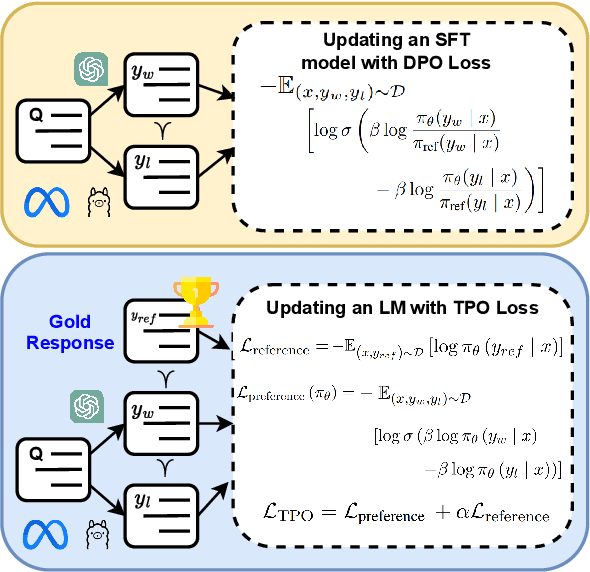



Abstract:Large Language Models (LLMs) perform well across diverse tasks, but aligning them with human demonstrations is challenging. Recently, Reinforcement Learning (RL)-free methods like Direct Preference Optimization (DPO) have emerged, offering improved stability and scalability while retaining competitive performance relative to RL-based methods. However, while RL-free methods deliver satisfactory performance, they require significant data to develop a robust Supervised Fine-Tuned (SFT) model and an additional step to fine-tune this model on a preference dataset, which constrains their utility and scalability. In this paper, we introduce Triple Preference Optimization (TPO), a new preference learning method designed to align an LLM with three preferences without requiring a separate SFT step and using considerably less data. Through a combination of practical experiments and theoretical analysis, we show the efficacy of TPO as a single-step alignment strategy. Specifically, we fine-tuned the Phi-2 (2.7B) and Mistral (7B) models using TPO directly on the UltraFeedback dataset, achieving superior results compared to models aligned through other methods such as SFT, DPO, KTO, IPO, CPO, and ORPO. Moreover, the performance of TPO without the SFT component led to notable improvements in the MT-Bench score, with increases of +1.27 and +0.63 over SFT and DPO, respectively. Additionally, TPO showed higher average accuracy, surpassing DPO and SFT by 4.2% and 4.97% on the Open LLM Leaderboard benchmarks. Our code is publicly available at https://github.com/sahsaeedi/triple-preference-optimization .
 Add to Chrome
Add to Chrome Add to Firefox
Add to Firefox Add to Edge
Add to Edge